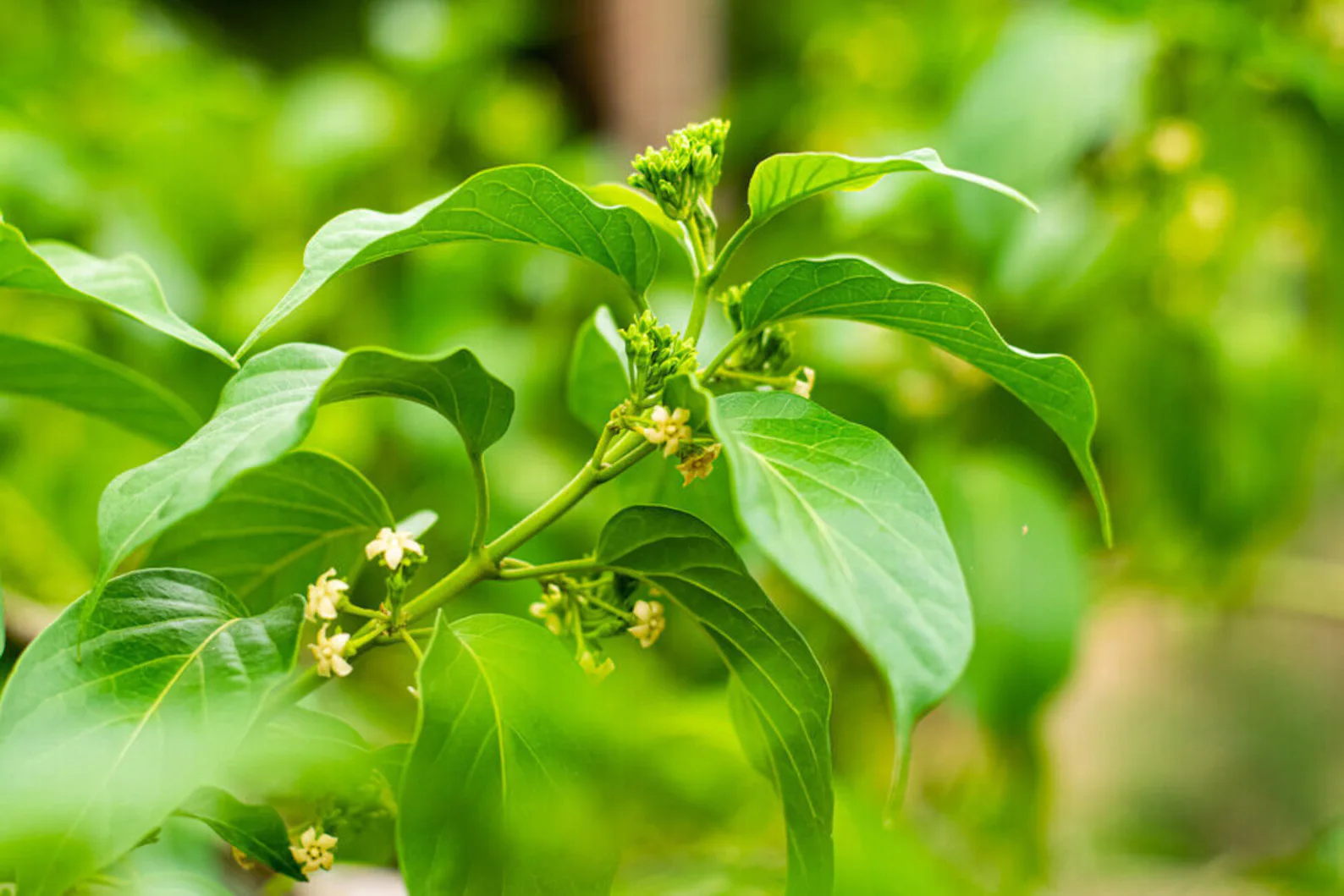Madhunashini (Gymnema sylvestre), is a significant medicinal herb that is well-known for its ability to prevent diabetes and help maintain a healthy blood sugar level. Its preparations have a significant impact on taste modulation, especially when it comes to squelching sweet taste perception. Gymnema sylvestre is referred to as Gurmar, or “sugar destroyer” in Ayurveda text. This is due to its amazing ability to momentarily stop the taste buds from perceiving sweetness. Madhunashini is amicably a powerful herbal remedy for naturally managing diabetes that helps improve blood sugar regulation and lessen sugar cravings. It stimulates the pancreas and also aids in the secretion of a balanced amount of insulin, which converts excess glucose to glycogen. Incredibly successful at controlling type 2 diabetes by raising insulin production and lowering blood sugar levels, Madhunashini is believed to prevent the body from absorbing glucose and balance lipid levels to also aid with heart disease and weight loss by lowering bad cholesterol (low-density lipoprotein, or LDL) and raising the good cholesterol (HDL). Add on: Gymnema sylvestre is ‘Alpha Amylase Inhibitor’ which reduces sugar absorption in the body. Gymnema has been shown in clinical trials to be effective for both type 1 and type 2 diabetes. In this sense, it works by improving cell activity and increasing the number of pancreatic β-cells, which would boost insulin release. Gymnema includes compounds that reduce intestinal absorption of sugar. Gymnema sylvestre is a traditional medicinal herb that helps diabetics because of its anti-obesity properties and capacity to suppress sweet taste. Supplements containing Gymnema sylvestre help reduce blood sugar levels both during fasting and after meals. By inhibiting sugar receptors, it stops glucose from being absorbed into the bloodstream.
How Fenugreek (Methi) Seeds Help in Diabetes
Fenugreek seeds, also known as Methi dana, have a wide range of health advantages. As they control blood sugar levels, they are essential in the management of diabetes. It is because of its high fiber content; it is believed that fenugreek aids in lowering blood sugar levels by promoting sugar absorption. Fenugreek or Methi seeds have been shown by researchers to enhance insulin sensitivity, control blood sugar level and also help lower cholesterol. It is believed that fenugreek seeds or methi daana, aid in blood sugar regulation by helping to ease insulin resistance and offer anti-diabetic effects. Fiber and other compounds found in the Methi seeds help to slow down body’s absorption of sugar and carbs. Additionally, the seeds may enhance the body’s utilization of sugar and boost the release of insulin. This is supported by researches that there is ability of Fenugreek seeds to decrease blood sugar in diabetics. Therefore, Methi seeds can be used to help people with diabetes to control their blood sugar level and increase their sensitivity to insulin. For diabetics, fenugreek seeds provide a wealth of health advantages: High in fiber and vital components, it aids with blood sugar regulation. Add On: By improving insulin action at the cellular level and using glucose in the peripheral tissues, fenugreek may improve insulin sensitivity and lower HbA1c levels. Powdered fenugreek seed increases glucose tolerance and decreases fasting blood glucose levels. There are some anti-diabetic effects of fenugreek, including increased insulin sensitivity. Compounds and soluble fiber found in fenugreek seeds may assist type 2 diabetics become more insulin sensitive and reduce blood sugar levels. The unusual amino acid 4-hydroxyisoleucine, which is present in fenugreek, may account for its potential benefits in blood sugar regulation. Supplementing with fenugreek has been demonstrated to improve FPG, HbA1C, HOMA-IR, TC, LDL-C, HDL-C, and BMI in individuals with type-2 diabetes.
Amla: A Natural Superfood for Diabetes Management
Amla (Indian Gooseberry) is a powerhouse of nutrients that can help manage diabetes naturally. Rich in Vitamin C, antioxidants, and fiber, amla not only strengthens immunity but also supports healthy digestion, metabolism, and blood sugar control. Regular consumption can reduce sugar spikes and prevent complications related to diabetes. Key Benefits of Amla for Diabetes 1. Regulates Blood Sugar Amla has hypoglycemic properties that help control blood sugar levels. Prevents sudden spikes and crashes in blood glucose, making it beneficial for Type 1 and Type 2 diabetes. 2. Improves Insulin Sensitivity Amla helps the body use insulin more effectively, reducing insulin resistance. Supports better glucose absorption by cells, keeping sugar levels stable. 3. Boosts Metabolism & Digestion Enhances digestion and gut health, preventing excess sugar from accumulating. Its high fiber content slows down sugar absorption, helping in better diabetes management. 4. Reduces Cholesterol & Heart Risks ❤️ Lowers bad cholesterol (LDL) and triglycerides, reducing the risk of heart diseases. Supports healthy blood circulation, protecting the heart from diabetes-related complications. 5. Strengthens Immunity Packed with Vitamin C and antioxidants, amla boosts immunity and fights infections. Protects against seasonal illnesses like colds, flu, and infections. How to Include Amla in Your Diet? Fresh Amla Juice – Drink 30-50 ml on an empty stomach in the morning. Amla Powder – Mix 1 teaspoon with warm water or smoothies. Raw Amla – Eat it as a fruit or add it to salads. Amla Candy or Pickle – A tasty way to enjoy its benefits (choose sugar-free versions).



